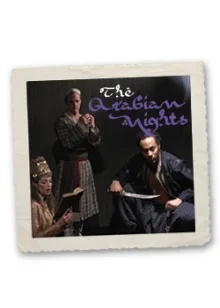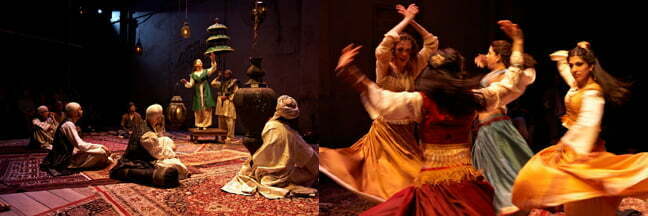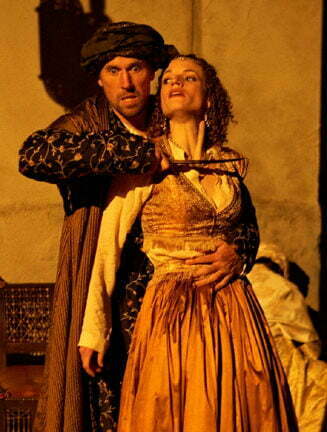The Arabian Nights
Lookingglass Theatre
Written and Directed by Mary Zimmerman
Adapted from The Book of the Thousand Nights and One Night
Translated by Powys Mathers
Mary Zimmerman’s magic carpet lands at Lookingglass
Beige fabric covers everything, creating interesting configurations on a stage taking up nearly the whole floor of the theater. The expectant audience, ringing three sides, watches and waits to learn what lies beneath the expanse of cloth.
Three percussionists beating Arabian hand drums enter, setting up pulsing rhythms. The cast, gaily attired in exotic garb, rapidly arrive and rip off the sheets, toss cushions into the air, and disclose decorative low tables and colorful Persian carpets waiting to be unrolled.
This peels off the first layer of a multi-layered evening filed with stories, and more stories and stories hidden within stories. Everything will be unwrapped, illuminated by elaborate lanterns which now descend from the ceiling. The scene is set for the framing tale: how Scheherazade (Louise Lamson) prevents her husband, King Shahryar (Ryan Artzburger) from killing her with the dawn of each new day, staying her execution for 1001 days, by telling him compelling stories that pique and continue his interest.

We begin with the original wife – the unfaithful one, see her infidelity, see her slain, and hear the King make his vow to wed, bed and kill a virgin each night for the rest of his life.
The audience may well be familiar with the story of how Scheherazade’s avoids this fate, but this only whets their appetite to see Mary Zimmerman’s interpretation. We aren’t disappointed!

The depiction of Scheherazade is especially effective. Not only does the new “queen for a day” show requisite fear, and ingenuity, but she brilliantly complements each of the stories she relates. After she begins each tale, she often shadows the hero – using the same hand gestures, sometimes echoing the dialogue, creating a reverberation that reminds us that it is her tale, her life, that is the central message.
And what stories they are – varied in every way: characterization, humor, morals (or lack thereof). Stories include one about a hideous revenge on a merchant who spurned a lady’s advances, another deals with four lovers, consecutively hiding from a husband by cramming themselves into a small privy. A man dreams of achieving fame. Another man cannot recall a song which haunts him. Two men fight over the possession of a tiny bag which they claim contains impossibly large objects (even humans). A king disguises himself as a commoner and discovers his alter ego. Another king loses his kingdom because of an overwhelming fart.
One of the best tales concerns “Sympathy the Learned” (Susan Jamshidi), a brilliant scholar who challenges all other scholars to match her erudition. She answers each riddle posed and wins the possessions of the conquered one. The questions – always philosophical – get more and more complicated and interesting, culminating in the questions of the king. Unfortunately, as he paces around her, his voice gets lower and lower, until it is impossible to hear his queries. This is the only caveat about the whole evening—that the actors sometimes seem so caught up in character interchanges that they forget to project their words to the audience.
Actions, however, often speak louder than words, especially in moments of great sensuality. Characters roll across the floor singly or in couples, feigning battle, feigning sleep, feigning sex, always provocative.
So many stories – so little time. The pace speeds up until a penultimate moment when the cast, breaking into smaller groups, enacts multiple stories simultaneously – a vivid cacophony of sound and action before they settle down to the one, final tale – number 1001.
The 16 actors are amazing, many taking multiple parts, many in acrobatic roles, some playing musical instruments, all smoothly adjusting props – moving furniture, rolling and unrolling rugs — as they progress from scene to scene from market places, to throne rooms, bedrooms, harems, a madhouse and much more. In addition, there is the opportunity to let go when, at each performance, different performers improvise the story of the Wonderful Bag.
The Chicago tour follows sellouts performances at the Berkeley Repertory Theatre and the Kansas City Repertory Theatre.
Kudos to Andre Pluess for a musical score that enriches the action, Dan Ostling for his brilliant, versatile set, Mara Blumenfeld for vivid costuming, and most of all to Tony Award winning ensemble member Mary Zimmerman for her dazzling, magical vision. Zimmerman, who first produced the Arabian Nights in 1992, ‘in the shadow of the first Gulf War,” says, “It remains for us an attempt to embody the remarkable richness of one of the great masterpieces of world literature. In spite of time, distance, and the rhetoric of difference, we find in these character and tales – over and over – ourselves.”
HIGHLY RECOMMENDED
Reviewed by Beverly Friend
Lookingglass Theatre, Water Tower Water Works, 821 N. Michigan Ave. at Pearson, 312-337-0665, Lookingglasstheatre.org, Tickets are $30-60. Wednesdays through Sundays 7:30 p.m., Thursdays, Saturdays and Sundays, 3 p.m, through July 12, Run time 2 hours 45 min. with intermission.
